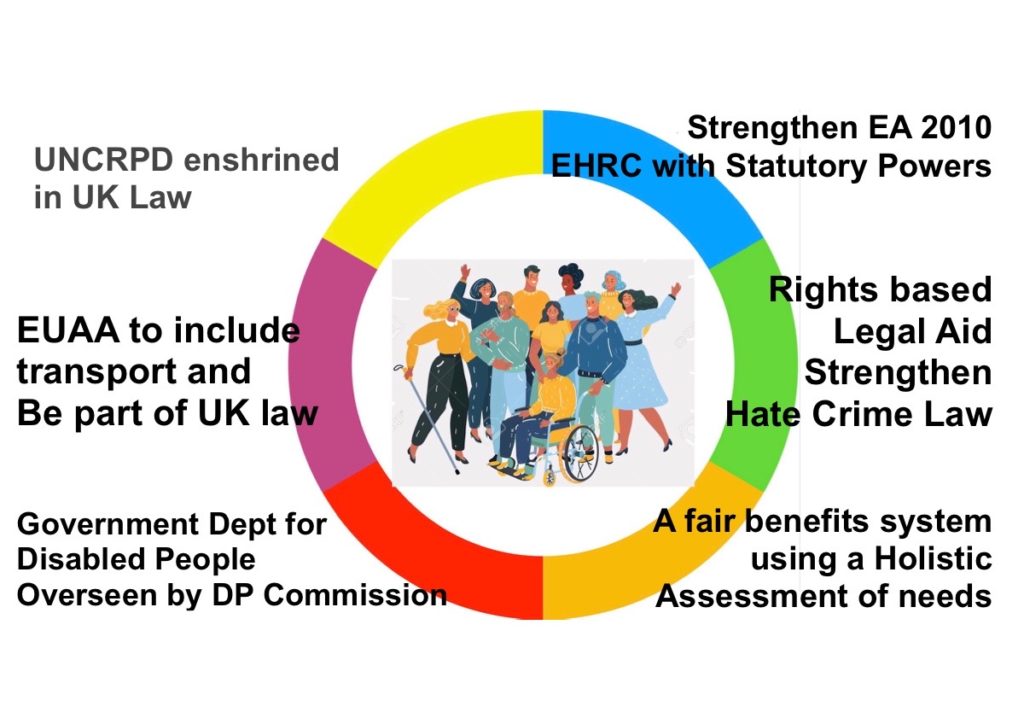A Human Rights Approach to Disability Campaigning
Ten years ago the Equality Act 2010 came into being. It received Royal Assent on 8th April and came into law on the 1st October 2010.
The Equality and Human Rights Commission, set up under the Equality Act 2006, has responsibility for the promotion and enforcement of equality and non-discrimination laws in England, Scotland and Wales. However, its powers are few. For instance, it cannot bring enforcement action, something the equivalent bodies in the US, Australia, Belgium, Canada and New Zealand can do.
We still don’t have equality in Hate Crime Law and we all know how inaccessible planes and trains can be. There are still too many buildings which are not fully accessible to us.
We have moved on, in the majority of situations, from the outdated Medical Model of Disability. Most statutory bodies and organisations accept the Social Model of Disability, which sees that our difficulties are caused by the disabling world we live in.
So how do we change that disabling world? Demonstrations and petitions can make some difference, but change is slow and cumbersome. So we need to think more imaginatively.
Why not base our demands on our Human Rights?
When the UN Special Rapporteur visited the UK in November 2018 he made it Abundantly clear the UK was in violation of its Human Rights obligations.
I believe the only way we can assert our rights to disability equality and reasonable adjustments, as well as living our lives independently, is by ensuring all our campaigning is linked to our Human Rights.
There are six areas we need to focus on, all of which are depicted in the graphic below. It has disabled people in the centre – where we belong.

The UN Convention on the Rights of People with Disabilities – UNCRPD – is the foundation of the legislation we require and by making it part of UK law we would have the protections and freedoms we need.
By strengthening the Equality Act 2010 and beefing up the powers of the EHRC, UK law would ensure enforcement of our rights, with the ability to challenge any type discrimination.
We need a rights based legal system, which is easy to access and will give support throughout the entirety of any reasonable case. Disability hate crime law needs strengthening to ensure parity with race and religious hate crime.
The rights enshrined in the EU Accessibility Act need to become part of UK law. The inclusion of all forms of transport is vital to ensure we can travel with ease and safety when we wish to travel.
We need a government department that looks after our rights and needs. The department must be run on different rules from other ministries. It should be overseen by a commission of disabled people, who will decide both policy and strategy.
But all of the rights above will only fully benefit us if we have the foundation of an equitable and secure benefits system. The system must use a holistic assessment of our needs. Of course, it will need to be properly funded with the same type of triple-lock guarantee given to pensioners. All of that will give us security and dignity. It would replace the current system, which demonises and denigrates us.
The last Labour Manifesto contained a pledge to enshrine the UNCRPD in UK law. We could make that the starting point for our demands.
Why not set up our own disabled peoples commission, with representatives from every DPO in the UK? Then we can begin to focus on our aims and look at how we can begin and sustain our campaign.
Will you make your new year resolution to campaign for human rights for ALL disabled people?